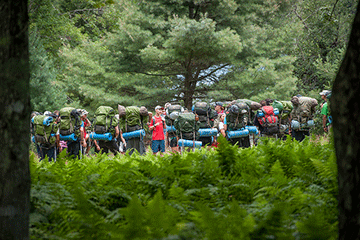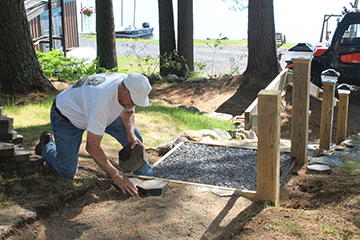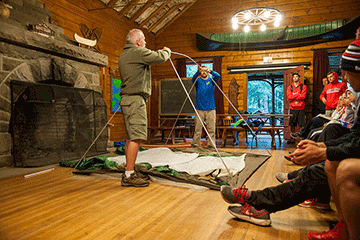
07/17/2018
Rhonda Jacobs Pitoniak ’01, M ’16 has a colorful name for the way maintenance had been approached at the William H. Parks Family Center for Environmental and Outdoor Education before the creation of a five-year, $1.25 million repair and upkeep plan.
“We’re trying to move away from disaster du jour,” joked Pitoniak who, as camp center director, has personally taken a wrench to more than her fair share of drippy sinks and leaky toilets at the College’s two historic camps.
“We want to get to a point where we are looking at preventive maintenance rather than repairing things when they break: when they are beginning to pass their prime,” she said.
Starting in the 2016-17 academic year, the College implemented a five-year rolling plan to devote $250,000 per year to restoring or upgrading the College’s two Adirondack camps, sited at different locations along the wooded shores of Raquette Lake.
Because of this approach, the College this year did routine building maintenance and made extensive repairs to the Camp’s main dock, heading off deterioration that would have eventually required replacement. During the 2018-19 academic year, the College will upgrade the facility’s water treatment plant and electrify the work shed at Antlers, the more accessible of the two camps. The current plan runs through 2022.

Annual support for the improvements and renovations includes $100,000 in New York state funding earmarked for critical maintenance, $100,000 from the campus-wide budget of the Facilities Planning, Design and Construction Office (FPDC), and $50,000 in gifts to the Raquette Lake Facilities account managed by the Cortland College Foundation.
“One of the main reasons the Facilities Planning Design and Construction office is doing it this way is because that’s the way budgeting is done for the campus,” Pitoniak said. “It’s the first time Parks Family Outdoor Center has been included in five consecutive years that I’m aware of.”
Money previously was doled out for one project at a time, for example when a camp building needed a new roof or the Raquette Lake campus required a new carpentry shop, she said.
The more remote camp, Camp Huntington — once called Camp Pine Knot — was built in the 1870s by William West Durant, considered to be the grandfather of the unique Adirondack Great Camp style of architecture on this very site. Acquired by SUNY Cortland in 1948, the camp in 2004 was named a National Historic Landmark.
Camp Huntington features more than a dozen individual buildings, most of them constructed before the turn of the 20th century in the original rustic Adirondack great camp style. Some were built to replace structures destroyed in 1983 by a fire.
The College’s second camp on the lake, Antlers at William H. Parks Family Center for Environmental and Outdoor Education, is roughly as old as Camp Huntington but much less remote and inaccessible.
During the next five year plan, Camp Huntington will undergo extensive improvements based on a bark and log condition survey the College commissioned from Argus Architecture & Preservation, P.C. from Troy, N.Y.
Some areas will be graded for better drainage. Branches or trees that overhang structures and threaten to damage them will be removed, reducing the shade that hastens buildings’ decay. Damaged or rotting sections of log siding will be replaced. Problems with maintaining some buildings’ structural integrity will be addressed by replacing footings, stabilizing the soil near the buildings and repairing posts. Gutters will be added to keep rain water from running down the sides of structures. Chimneys will be cleaned and re-pointed. Trees will be cleared away from selected buildings and land surrounding them will be regraded for improved air flow to keep the foundations and exterior walls drier.
“Some of it will be easy for us to take care of and some will involve specialized contractors, historic renovations specialists, to come in and do the work,” Pitoniak said.

Camp Huntington’s main dock repair work began in November but was halted due to weather conditions. Work resumed this June.
One of the most important projects is next year’s upgrade of the water treatment plant.
“At times our capacity — the number of guests we can house — taxes the current water systems recovery time,” Pitoniak said of the system that draws and treats lake water and stores it in a tank on stilts.
The biggest Antlers projects for this year is more modest.
Antlers is going to be getting electricity for its shed shop, where Robert Brewster, the part-time caretaker hired last year so the College can stay on top of maintenance, will be able to run machinery, Pitoniak said.
“There’s a shed behind the actual lodge where he does carpentry and repairs,” she said. “He can build new screens, repair furniture, repair a door or build new frames.”
A new propane generator will be installed beside the shed. One addition to this project under consideration is an electric car charging station.
“The generator will run as backup when the power goes out so we will still have power for guests, as well as be able to run the water system in the Main Lodge,” Pitoniak said. “The projects are linked because they both include electricity. Both will involve digging trenches and running lines for electricity.”
The Main Lodge currently serves as Antlers’ longer season accommodations.
Visitors to Camp Huntington in coming years can expect to see the Swiss Chalet’s dilapidated railings replaced and the his and hers bath facility completely remodeled because the vintage 1984 replacement parts are no longer available. At Antlers, the Main Lodge will get a facelift, too, with new siding and insulation.
There’s much more upkeep to having the two camps than the considerable upkeep that generous alumni and friends can accomplish during the annual volunteer work weekends, held this year from May 4-6 at Camp Huntington and from May 11-13 at Antlers. At Antlers, alumni recently removed an old gas pump and installed proper steps leading up to the nearest cabin, Cedars.
“The need for fundraising to support the camps and the alumni volunteer work camps to keep them up will continue as before,” Pitoniak said.
“It’s a malleable plan so if something else were to come up that we think is more important, we would handle that.”